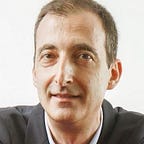The World Is Not Software
This strange view has become common: that every phenomenon in the world can be reduced to information processing
It is an extreme vision shared by many scientists and engineers that the world is equivalent to software. It is surprising but a natural conclusion during an era in which technology is pervasive and a big part of the economy and society becomes digital. Science is also often embraced as the sole perspective on reality, which makes it difficult to face the complexity of the world and especially the most essential phenomenon for humanity, which is consciousness. For millennia it was a central topic for philosophers but it also appears in discussions about artificial intelligence whose goal is ultimately to replicate all human cognitive capacities, since its early beginnings in the 50s. However, the discussion is completely different from a philosophical and from a technological perspective, though some philosophical schools tend to closely align to science. While philosophy faces the complexity of reality, keeping the mind open to exploration, science aims to simplify and make things computable by enclosing the world into formal systems. Inside such a system, consciousness can only be considered an epiphenomenon, which makes it compatible with the belief that artificial intelligence, essentially just a form of software, will eventually replicate all human experiences, including consciousness itself.
In this view, everything that constitutes life and humanity is indeed equivalent to software. Extending this idea, every phenomenon in the world can be reduced to information processing and replicated by software. Taking the argument one step further, the world actually is software, and this gives rise to the “simulation hypothesis”. The conclusion is absurd but the reasoning is rather strong as long as you stay within the framework of science and if you believe it potentially offers a sufficient representation of the entirety of reality. By principle, no one can invalidate the conclusion that the world is equivalent to software when arguing from within the framework of science. But this conclusion cannot be validated from within this framework either, because it remains in the realm of belief. The belief is precisely that science is the sole valid approach to reality, excluding in particular philosophy, which is able to question this belief. Science, including computer science, is a formal framework and by definition, it’s impossible to step outside of it from within. This is the source of both its immense strength and profound weakness, but the power of science and technologies hides its own limits.
Consciousness obviously precedes science, which cannot exist without it. The inception of the first symbols depends on consciousness and natural language, as they initially lack other symbols from which to be defined. Even once some symbols have been created, the process of defining subsequent symbols still needs consciousness to create connections with them. Eventually, after a complete formal system, like arithmetic, is defined, it does not make any sense without human interpretation, which needs consciousness. The entire field of science is nothing without human consciousness, and the reality it describes only makes sense to humans. The power of science lies in the reduction of a perceived reality into a system of symbols and rules that can be shared as an objective representation reflecting the multi-human subjective experience. This reduction allows for the extraction of a somewhat coherent formal representation we can base calculations on, and build technology upon. The transformation of many subjective experiences into a common objective representation of reality is the beauty of science. The reduction that inevitably comes with this necessity to objectify reality sets the limits of what science can explain. Beyond these limits lies our subjective experience, which is at the origin of any science.
